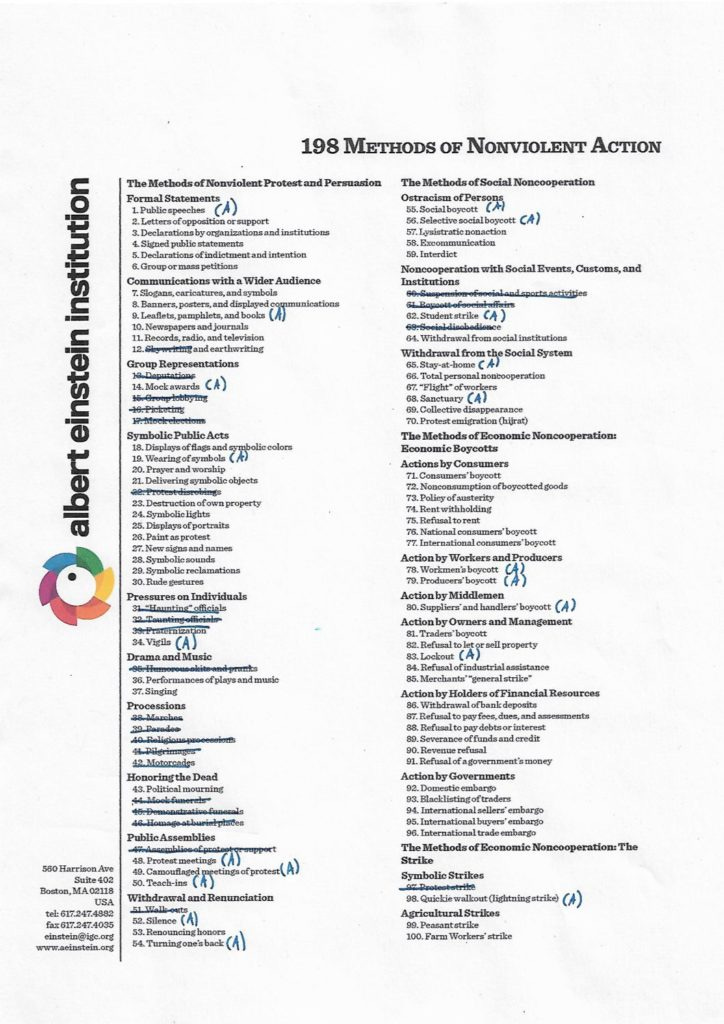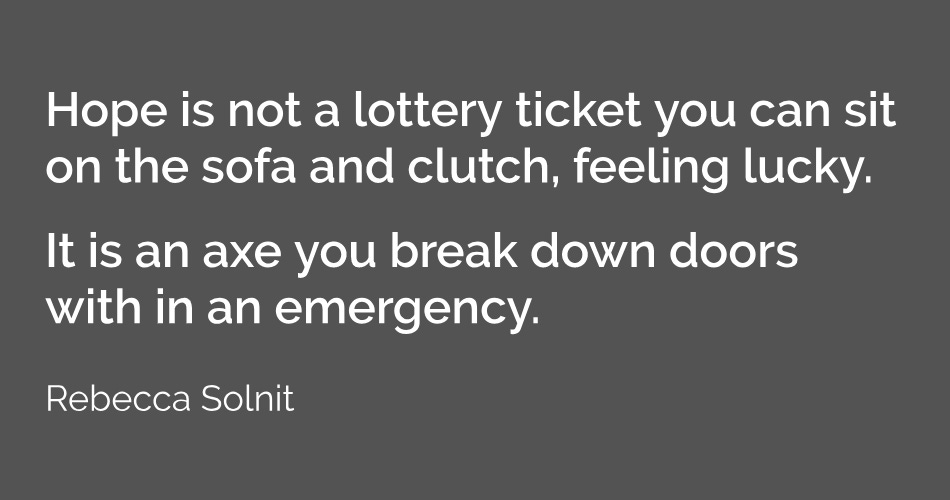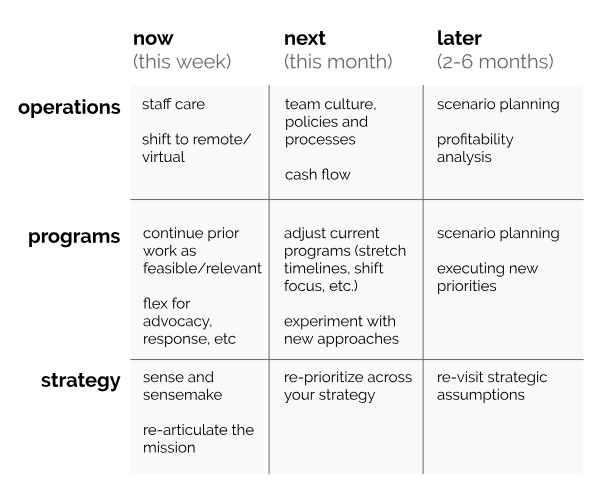Welcome to Peak Uncertainty

Welcome to Peak Uncertainty. Population: You. (And your team. And probably everyone else.)
A few weeks ago I put out a framework on how to plan in this period where the trajectory of the pandemic is especially unclear. It's a rapid planning process aimed to help you focus at a time when many of us are struggling to do so.
Folks have found it useful so I thought I'd lead the newsletter with a link. But you'll have to scroll down further for more on that—let's focus on the ideas and practices coming from other corners in this moment.
In this newsletter
Organizing while social distancing: There's been a lot of good thinking about how to shift organizing and activism, both due to social distancing and in response to the pandemic's threats and political possibilities.
Navigating the uncertainty: Some good guidance from a few others on how to plan, make decisions, and lead during uncertainty.
Metaphors matter: The dominant metaphor used for the pandemic has been war. That rhetoric might mobilize political resources otherwise unavailable during "peacetime"—but at what cost?
Don't waste a crisis: What are the bad guys up to? A few reflections on how authoritarians and kleptocrats are building power in this moment.
Who else is responding and how: While everyone scrambles to adjust their work or launch new programs, I've found a few good descriptions of some of the work happening across different parts of the social change sectors.
Organizing while social distancing
Isolation and the so-called "lockdowns" have thrown a wrench in many organizing plans—especially with ongoing campaigning for the US elections. Now that we're adjusted to the (temporary) normal, folks are starting to think through how to organize and mobilize in the near/medium-term. Here are a few of the best pieces I've found on the subject.
7 things to do instead of hoarding toilet paper - Rae Abileah and Nadine Bloch of Beautiful Trouble on how to take leadership from the most impacted, how to make the invisible visible, and more.
We need creative campaigning more than ever during the coronavirus crisis - MobLab says you should walk away from last month's theory of change.
Building Trust, Confidence and Collective Action in the Age of COVID-19 - from Alex Evans and David Steven: tell a story of hope, defend the science, nurture the grassroots, confront new inequalities, deter profiteers.
COVID-19 and Campaigning - Tom Baker says an abundance of tactics still apply (see pic, below).
The Vanishing Public Square - Micah Sifry on doing better virtual politics, rather than merely mapping old functions onto digital realms.
Coronavirus Demands a Quantum Leap in Organizing - Marc Ruben and Lilly Daigle of M+R, with Marc Walsh from 360 Campaign, had an early piece (a month ago! what a different time) on the need to move to virtual volunteer meetings, ramp up relational organizing, and more.
Coronavirus Communications - Ted Fickes of Bright+3 has compiled a spreadsheet with links to guidance, examples, and resources on coronavirus-related communications.
How to organise in a lockdown: five messages for campaigners - Tom Wein says one-on-one is still possible even when face-to-face isn't.
There's no going back. Here's how our network of campaigners is responding to and collaborating in this crisis - Ani Hao draws "aha" moments from two community calls MobLab held with >150 campaigners and others at the end of March. Big one: it's time to rethink your strategy and communications.
On the strikes:

Gene Sharp's "198 Methods of Nonviolent Action" (1973) annotated by Tom Baker for their relevance under social distancing: strike-through means not applicable; (A) means applicable with adaptation; no marking means applicable. More here.
Navigating the uncertainty
Some great advice from a range of sources on management and leadership during periods of uncertainty.
Managing Change During the Pandemic - Paul Schmitz of Collective Impact Forum shares some advice ("lean into empathy") and a thoughtful set of questions to ask yourself in this moment.
Adaptive leadership in the coronavirus response - Ben Ramalingam, Leni Wild, and Matt Ferrari outline a really interesting model that grapples with the complexity of pandemic response (though not with the complexity of political leadership, I think).
Citizen input matters in the fight against COVID-19 - Britt Lake of Feedback Labs on the role of public input and local expertise as critical complements to technical expertise.
Deciding Well in Tumultuous Times - Ian David Moss puts forward a decision framework and some advice for donors. Among many other insights, it includes a good 2x2 looking at different approaches based on the stability of the system vs. our knowledge of the system. (Though I disagree with his assessment that we have high knowledge of the system at the global level.)
Introducing the Principles of Equitable Disaster Response - Greg Bloom shares a set of principles crafted by mutual aid veterans from Sandy, Harvey, Irma, Katrina, and other hurricanes. Principles include: Ask—and listen. Distribute Power. Collaborate Strategically. (Not one of the principles, but I also appreciate this sentiment: "something is not necessarily better than nothing".)
The Management Center’s COVID-19 Policy Changes & Other Responses - On the super-practical side, The Management Center is sharing some of the policy changes they've made. And you can take these as good examples because, well, it's The Management Center.

Metaphors matter
As Stephen Jay Gould wrote: "Our mind works largely by metaphor and comparison, not always (or often) by relentless logic." How has metaphor been used to help us understand and respond to a global pandemic? While many of us slip into lazy language, I've found a few thoughtful provocations on how to talk about what's happening right now.
War, What Is It Good For? - Radio show/podcast On the Media did a segment on the war metaphor with several good interviews. I especially like Eula Bliss' introduction of the learning metaphor: that immunologists often talk of a virus "educating" the immune system. And it made me wonder, as painful as these lessons are, what we as a society are learning in this moment?
Framing COVID-19 - A series of tip sheets from FrameWorks Institute on framing for the common good, making the case for the role of government, widening the circle of "we", and more.
Pandemic Metaphors - The Public Interest Research Centre reviewed the two most prominent metaphors of war and crime ("lockdown"), and points to a few more positive metaphors (e.g. response as construction or journey).
A Pandemic Is Not a War - Eve Fairbanks talked to people who have lived through wars in Rwanda, Sierra Leone, and elsewhere to learn what they think of the war metaphor. It's a long read, but a very thoughtful reflection on the experience of living through the pandemic—including how it might be harder than war.
Don't let a good crisis go to waste
As many have noted: we don't want to go back to the old normal, even if we could—the old normal is what got us here. But while many campaigners are advancing a positive agenda of workers' rights and universal health care, the bad guys are also capitalizing on this moment.
Coronavirus Capitalism—And How to Beat It - a short video with Naomi Klein discussing the right-wing agenda being pursued through the coronavirus resonse.
How Will the Coronavirus Reshape Democracy and Governance Globally? - Frances Z. Brown, Saskia Brechenmacher and Thomas Carothers review the pandemic's knock-on effects, starting with the centralization of power and closing democratic space, through to electoral disruptions, threats to social cohesion, and corruption—and maybe one or two positive outcomes too.
The Worry of Governance: Coronavirus and Emergency Politics - Graham Teskey reviews questions raised in articles by Rachel Kleinfeld, Francis Fukuyama, and others and comes up with a neat checklist of possible negative and positive governance consequences from the pandemic. (Where you land in balance may hinge on how optimistic/pessimistic you're feeling today.)
The People in Charge See an Opportunity - Anne Applebaum describes what she's seeing in Poland and elsewhere as (would-be) authoritarians use the crisis to consolidate power—and how many people go along with it.
Who else is responding and how
There's a lot of new activity happening right now, so thankfully a few brave folks have tried to capture what they're seeing in their respective spheres.
Civic tech
Civic Tech Field Guide on COVID-19 Community Response - from Civic Hall
Civic Tech takes on a pandemic - a long (but not comprehensive) list of projects underway across the Code for All network
Open gov
Collecting Open Government Approaches to COVID-19 - from the Open Government Partnership
Funders
Funding for coronavirus - from Candid
Our Members Response to COVID-19 pandemic - from the Transparency and Accountability Initiative (a donor collaborative)
Coronavirus emergency aid funding - from The New Humanitarian
Data
COVID-19 Data Collaboratives - a repository of data collaborative projects
Local action
The social support networks stepping up in coronavirus-stricken China - Mi You writing on openDemoracy
COVID-19, localization and locally led development: A critical juncture - Chris Roche and Fiona Tarpey on the possibility to accelerate the localization agenda in the humanitarian and development sectors
COVID-19 and Civil Society: Can We Think Long-Term Amidst a Crisis? - Deborah Doane on Rights CoLab about the need to respond with more locally led civil society, and a more inclusive understanding of global civil society.
People are helping each other fight coronavirus, one Google spreadsheet at a time - Sigal Samuel writes on Vox about mutual aid groups in the US.
Bonus: How to Respond to a Pandemic When Our Institutions Can’t - my old colleague and friend Panthea Lee describes what she's learned working with a mutual aid group in Bed-Stuy, Brooklyn.

Back to Peak Uncertainty
The core framework I shared a few weeks ago is a 3x3 planning grid looking at three levels of your work (operations, programs, strategy) across three timescales (now, next, later).
The grid above shows a few common issues that I was hearing clients describe in each square; depending on where you are (both geographically and organizationally) some of these details may no longer be relevant to you. But the overall planning framework should still be useful as long as we're in this period I'm calling Peak Uncertainty.
Writing two weeks ago, I speculated that this period would last a few more weeks—after which we wouldn't reach any "new normal" but would at least have greater clarity on the pandemic's trajectory. Reflecting now, while I think it's largely true that we have greater clarity, big questions remain in the epidemiological (e.g. regarding immunity), economic, and geopolitical realms. Perhaps Peak Uncertainty will be with us longer than I thought.
It's worth also reflecting on how different this period is. Lots of folks (including myself) have been writing for a while about how "adaptive management" and "agile strategy" and whatnot can help you navigate uncertainty. Is this just the same, but a bit more? I'd argue it's a difference in degree that makes a difference in kind: not only are you facing greater uncertainty in your work, but everyone is in every sector, in every country, simultaneously.
In terms of the Cynefin framework, everything got bumped one notch higher: the simple has become complicated, the previously complicated is now complex, and everything that was "merely" complex is now in chaos. I still think we'll see things settling back to their prior states, but I feel less sure about when that will happen.
--
That's all from me. Hope you and yours are well. Take care of each other.
Dave



